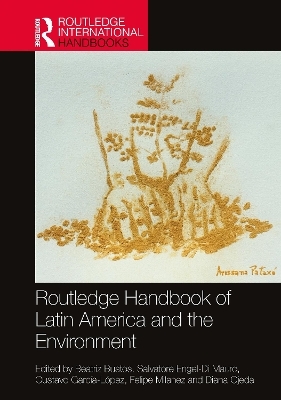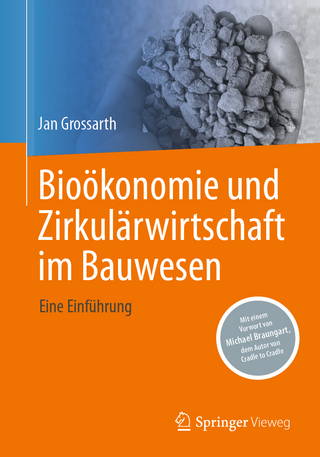
Routledge Handbook of Latin America and the Environment
Routledge (Verlag)
978-0-367-36186-0 (ISBN)
Latin America has seen an acceleration of environmental degradation due to the expansion of resource extraction and urban areas. This Handbook addresses Latin America not only as an object of study, but also as a region with a long and profound history of critical thinking on these themes. Furthermore, the Handbook departs from most treatments on the topic by studying the environment as a social issue inextricably linked to politics, economy, and culture. The Handbook will be an invaluable resource for those wanting not only to understand the issues, but also to engage with ideas about environmental politics and social-ecological transformation. The Handbook covers a broad range of topics organized according to three areas: physical geography, ecology, and crucial environmental problems of the region. These are key theoretical and methodological issues used to understand Latin America’s ecosocial contexts, and institutional and grassroots practices related to more just and ecologically sustainable worlds.
The Handbook will set a research agenda for the near future and provide comprehensive research on most subregions relative to environmental transformations, challenges, struggles and political processes. It stands as a fresh and much needed state of the art introduction for researchers, scholars, post-graduates and academic audiences on Latin American contributions to theorization, empirical research and environmental practices.
Beatriz Bustos is an associate professor in the Department of Geography at the University of Chile. Her research focuses on resources geography and the sociopolitical transformations that exploitation of natural resources produces in rural communities. Her work ranges from examining the geography of commodities such as salmon, copper, wine, agro-industries, coal, lithium and green hydrogen, to rural livelihoods under neoliberal extractive economies. More recently she is researching ideas of rural citizenship. Salvatore Engel-Di Mauro is Professor at the Department of Geography and Environmental Studies of SUNY New Paltz (US), teaching courses on physical and people–environment geography as well as on socialism. He is Senior Editor for Capitalism Nature Socialism and Reviews Editor for Human Geography. He has recently published Socialist States and Environment and, with George Martin, Urban Food Production for Ecosocialism. His research areas include soil contamination and acidification, urban food production, and socialism and the environment. Gustavo García-López is an engaged researcher, educator, and apprentice organizer, from the islands of Puerto Rico. He has experience in transdisciplinary social-environmental studies. His work is situated at the intersection of ecology and the political, postcolonial/decolonial, and Latin American and Caribbean studies. He engages with commons and commoning, autogestion, and environmental and climate justice issues. He is part of the JunteGente collective in Puerto Rico, the Post-Extractive Futures initiative, the Climate Justice Network and the Undisciplined Environments blog. He lives uprooted from his lands but finding home and guiding stars in his daughter Maia. He is held in life by broad networks of care and nourishment, of people, spirits, memories, and ecologies. Felipe Milanez is Assistant Professor at the Institute for Humanities, Arts and Sciences Profesor Milton Santos, at the Federal University of Bahia, Brazil. Author of Memórias Sertanistas: Cem Anos de Indigenismo no Brasil and Guerras da Conquista, with Fabrício Lyro, his work and activism focus on the violence against environmental defenders, the genocide of indigenous peoples and ecocide. More recently, his research dedicates to learn with indigenous art, anti-colonial epistemologies and political ecologies from Abya Yala. Diana Ojeda is Associate Professor at Cider (Center for Interdisciplinary Development Studies) at Universidad de los Andes in Bogotá, Colombia. Her work analyses processes of "green grabbing", dispossession, and state formation from a perspective that combines feminist political ecology and critical agrarian studies. More recently, her research has focused on pesticide use in Colombia.
Part I Introduction
Chapter 1. Suturing the Open Veins of Latin America, Building Epistemic Bridges: Latin-American Environmentalism for the 21st Century
Part II Biophysical Processes and Environmental Histories
Chapter 2. Latin American ecosystems vulnerability in a climate change scenario
Chapter 3. Soil degradation and land cover change in Latin America
Chapter 4. Climate Change Impacts on Caribbean Coastal Ecosystems: Emergent Ecological and Environmental Geography Challenges
Chapter 5. An Environmental History of the ‘Second Conquest’: Agricultural Export Boom and Landscape-Making in Latin America, ca.1850-1930
Chapter 6. Extractivism: The Port-a-cathed Veins of Guatemala
Chapter 7. Environmental Colonialism and Neocolonialism in Latin America
Chapter 8. Water scarcity in Latin America
Part III Latin American Environmental Issues in Political-Economic Context
Chapter 9. The Political Economy of the Environment in Latin America
Chapter 10. Ecological debt and extractivism
Chapter 11. Trajectories of adaptation to climate change in Latin American cities: Climate justice blind spots
Chapter 12. Environmental disasters and critical politics
Chapter 13. Latin America in the Chemical Vortex of Agrarian Capitalism
Chapter 14. Resource Radicalisms
Chapter 15. The fruits of labor or the fruits of nature? Towards a political ecology of labor in Central America
Chapter 16. Transnationals, Dependent Development and the Environment in Latin America in the 21st Century
Chapter 17. Challenging the logic of ‘the open veins’? The geography of resource rents distribution in Peru and Bolivia
Part IV: Environmental Struggles and Resistance
Chapter 18. Resistance of women from "sacrifice zones" to extractivism in Chile. A framework for rethinking a feminist political ecology
Chapter 19. Environmental conflicts and violence in Latin America: Experiences from Peru
Chapter 20. Quilombos and the Fight Against Racism in the Context of the COVID-19 Pandemic
Chapter 21. The "Greening" by Sustainable Development: Stretching Biopiracy
Chapter 22. Territorialization through the Milpa: Zapatismo and Indigenous Autonomy
Chapter 23. Indigenous Autonomies as Alternative Horizons in Latin America: Societal movements and other territorialities in Bolivia and Mexico
Chapter 24. Land occupations and land reform in Brazil
Chapter 25. From Chico Mendes to Berta Cáceres: responses to the murders of environmental defenders
Part V: Environmental Disputes and Policies
Chapter 26. Latin America's Approach in the International Environmental Debate. From Stockholm 72 to Rio + 20. Between "eco-development" and "sustainable development"
Chapter 27. Degrowth and Buen Vivir: perspectives for a great transformation
Chapter 28. Social Cartographies in Latin America
Chapter 29. Rights of Nature and Specialization in Jurisprudence: Moving Forward to Better Protect Our Environment?
Chapter 30. How tenure reform processes can lead to community-based resource management? Experiences from Latin America
Chapter 31. Environmental Policy and Institutional Change: The Consequences of Mobilization
Part VI: Toward Oppression-Free Futures
Chapter 32. Feminist thought and environmental defense in Latin America
Chapter 33. Decolonising time through communalising spatial practices
Chapter 34. Environmental Thought in Movement: Territory, Ecologisms, and Liberation in Latin America
Chapter 35. Agroecology and Food Sovereignty in the Caribbean: Insights from Cuba, Puerto Rico, and Sint Maarten
Chapter 36. Re-existance struggles and socio-ecological alternatives for reproduction of dignified and sustainable life in territories affected by the extractivist offensive in Latin America
Chapter 37. The Dimensions of Life: Environment, Subject, and Amerindian Thought
Chapter 38. Environmental Justice Movements as Movements for Life and Decolonization: Experiences from Puerto Rico
Chapter 39. Community Contributions to a Just Energy Transition
Index
| Erscheinungsdatum | 20.07.2023 |
|---|---|
| Reihe/Serie | Routledge International Handbooks |
| Zusatzinfo | 8 Tables, black and white; 38 Line drawings, black and white; 30 Halftones, black and white; 68 Illustrations, black and white |
| Verlagsort | London |
| Sprache | englisch |
| Maße | 174 x 246 mm |
| Gewicht | 1000 g |
| Themenwelt | Naturwissenschaften ► Biologie ► Ökologie / Naturschutz |
| Naturwissenschaften ► Geowissenschaften ► Geografie / Kartografie | |
| Sozialwissenschaften ► Ethnologie | |
| Sozialwissenschaften ► Soziologie ► Spezielle Soziologien | |
| ISBN-10 | 0-367-36186-8 / 0367361868 |
| ISBN-13 | 978-0-367-36186-0 / 9780367361860 |
| Zustand | Neuware |
| Haben Sie eine Frage zum Produkt? |
aus dem Bereich


